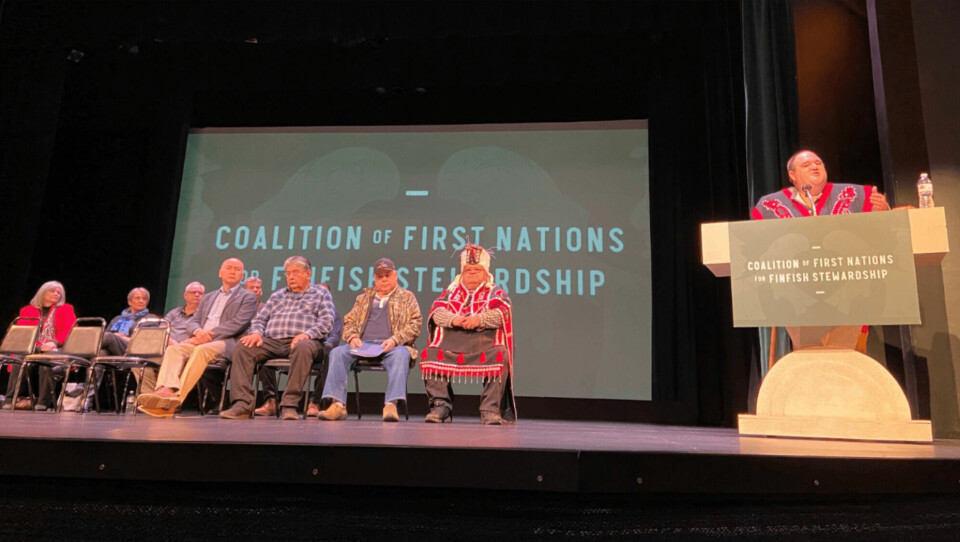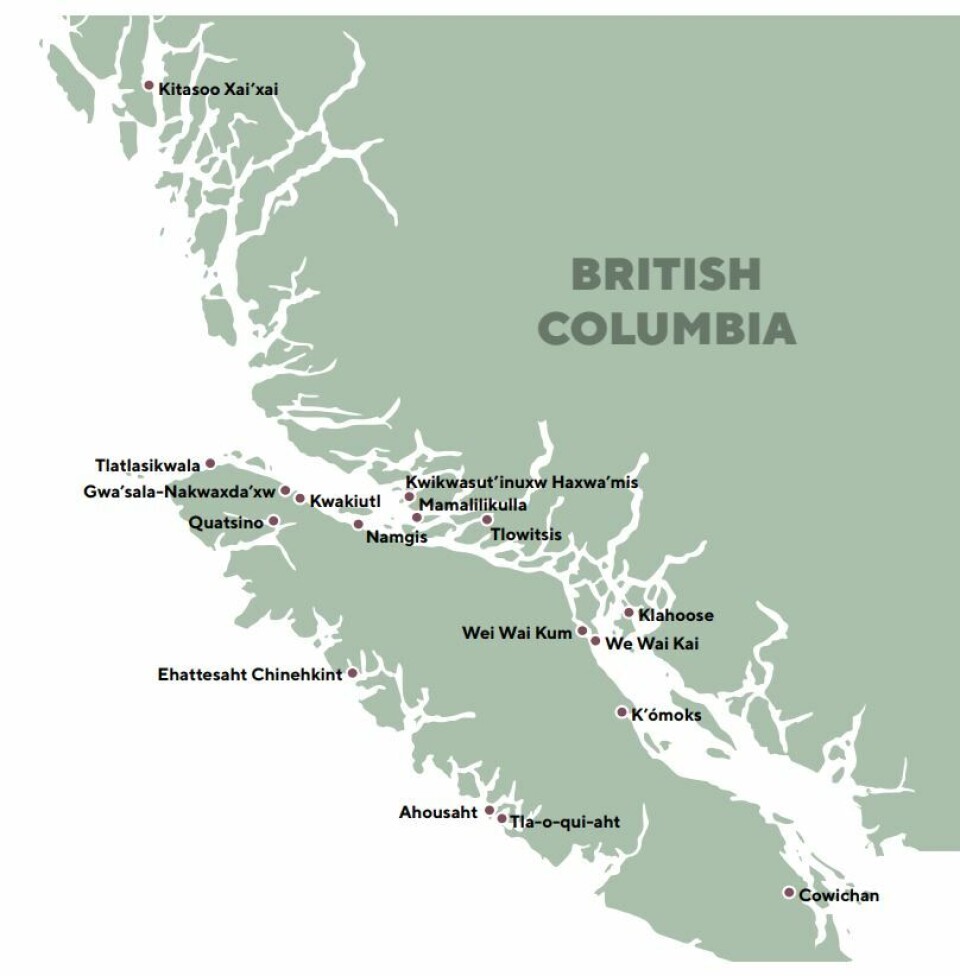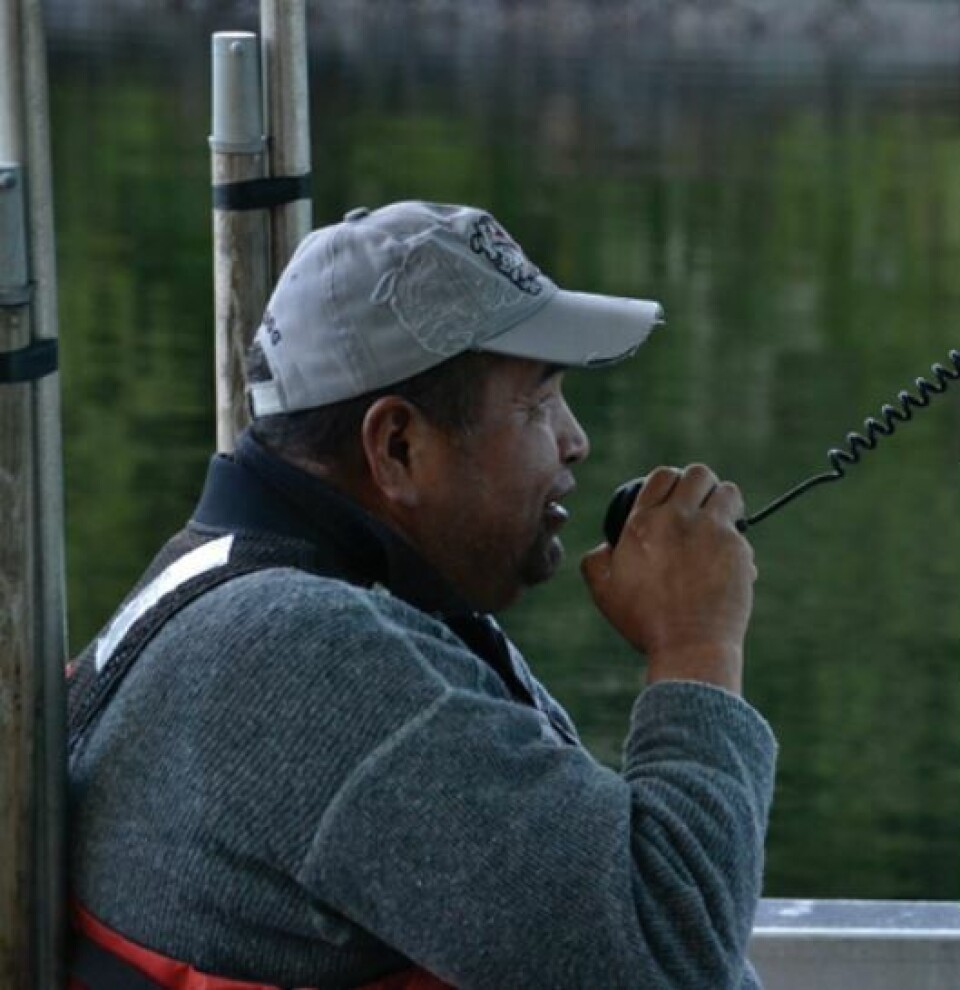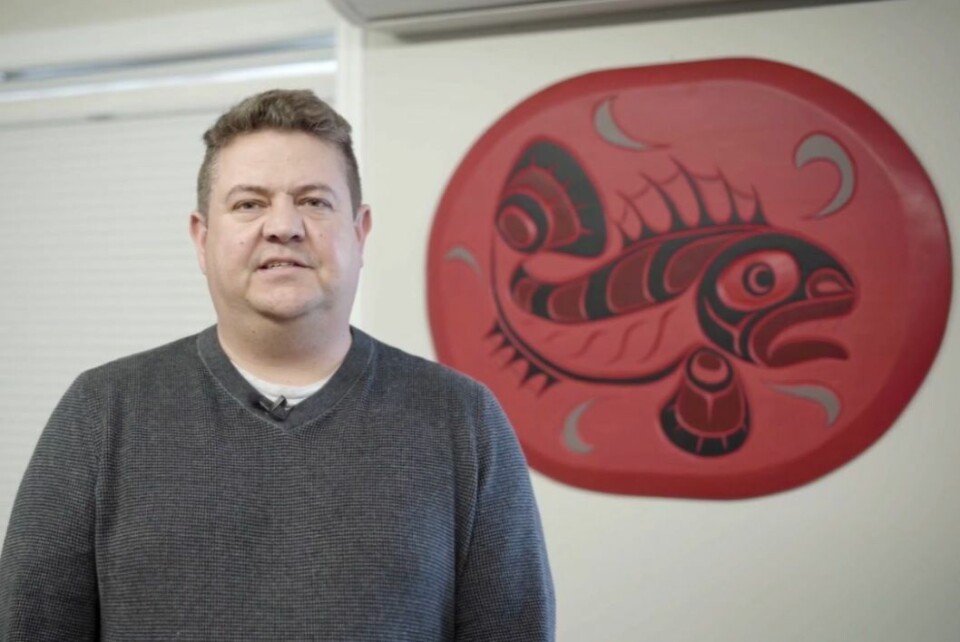
Coastal First Nations demand renewal of BC salmon farm licences
A coalition of First Nations in British Columbia has called on Canada’s federal government to immediately re-issue salmon farming licences in their territories to respect Indigenous rights and title.
There are 79 farms in BC which have licences that will expire in June and there are fears that federal fisheries and oceans minister Joyce Murray won’t renew them because of the ruling Liberal party’s commitment to “transition” from open-net pen farming in the province.
First Nations from the Coast Salish, Kwakwaka’wakw, Tsimshian, and Nuu-Chah-Nulth Territories in BC have now formed the Coalition of First Nations for Finfish Stewardship (FNFFS) to protect the jobs and income they receive from salmon farming.

Unfounded activist claims
The coalition points to a new report that says 276 jobs and $50 million per year are injected into coastal Indigenous communities from salmon farming.
When indirect and induced economic activity is factored in, First Nation interests in BC’s farmed salmon sector on and off reserves are estimated to generate $83.3m in economic activity, $47.8m in GDP, and 707 jobs earning $36.6m in wages per year.
In a press release, FNFFS stated: “Our coalition is opposed to the federal government disregarding science and bowing to unfounded activist claims on salmon farming that, if heeded, will severely damage our communities, and deny our rights and title. To protect these rights, our economic self-determination, and our members, our Nations call on the federal government to immediately re-issue salmon farming licences in our territories.
“Re-issuance will give us time to further engage with our members on the positive transition and diversification of the salmon farming sector. This process should be led by First Nation governance, economic development, and environmental stewardship resulting in a tangible expression of reconciliation. This will support the goals and future wellbeing of our communities, without compromising the surrounding ecosystem and wild salmon.
“Offering anything less than re-issuing licences flies in the face of the federal government’s commitment to reconciliation and the rights of Indigenous peoples, as well as their recent promise to support the participation of First Nations in the management of ocean resources.
“DFO (Department of Fisheries and Oceans) Minister Joyce Murray is listening to everyone but the Nations that will suffer the most if licences aren’t renewed. To date, many of the chiefs and leaders in our coalition have reached out to the Minister and they have either been ignored or told that the minister will go ahead with her agenda to transition farms out of the water in their territories, despite their concerns, and without their input or consent. This is not reconciliation.
“True reconciliation would see individual Nations decide how the sector fits into their waters and communities as the original participants in the coastal, Blue Economy. Moving to land-based salmon farming is not an option for the majority of our Nations, and if this is forced by government, our communities will lose the sector and all the benefits that come with it. We will suffer. Many will return to poverty and as the leaders and protectors of our Nations, we cannot allow that to happen.”

Lifted from poverty
The FNFFS said salmon farming had lifted entire coastal Indigenous communities out of poverty and didn’t harm wild salmon populations.
“As coastal Nations, wild salmon are our priority, and we would not put centuries of stewardship at risk for short-term gains. Participating Nations of this coalition recognise science shows that responsible salmon farming does not adversely impact wild salmon.
“Companies are held accountable for their actions, and we ensure they are committed to the constant improvement of their practices through technology and innovation.
“The ongoing development of relationships with the sector has seen First Nations taking on governance roles that have resulted in oversight of salmon farming within their traditional territories, which is true reconciliation in action. In some cases, many of our Nations are already conducting oversight of these salmon farms in our territories with environmental monitoring and Guardian programs.”
Five-year minimum
The FNFFS wants the federal government to recognise First Nations’ rights and title in managing marine resources in their territories and re-issue farm licences for at least five years.
“Re-issuing these licences with a minimum five-year term gives us time to properly engage with our members, government, and with the sector on 2025 aquaculture transition plans.
“There must be room for each plan to be unique and tailored to individual Nations’ values, socio-economic priorities, regional characteristics, and environmental conditions,” said the FNFFS.
“We expect these transition plans to respect each Nation’s asserted governance model and the true spirit of reconciliation; to represent our autonomous yet connected voices; to respect our rights and title; and to deliver positive outcomes for our communities, for our territories’ unique ecosystems, and for all of coastal British Columbia.”

FNFFS spokesperson Dallas Smith, of the Tlowitsis Nation, said: “The leaders of this coalition understand that what works for one Nation might not work for another, and we respect that each Nation, as Rightsholders, can decide for themselves what the transition of salmon farming means to them. How the sector will be managed and overseen in each territory will look as unique as the Nations themselves.”
Chief Chris Roberts, of the Wei Wai Kum First Nation, said: “For us as a Nation, and as part of the Laich-Kwil-Tach speaking Nations, this is about more than just the future of fisheries within our territory. This is about acknowledging the sovereign rights we hold over our territory and our ability to govern our territory.”
Lack of consultation
Roberts has previously criticised the federal government for a lack of consultation when former fisheries minister Bernadette Jordan decided to close 19 salmon farms in the Discovery Islands in December 2020, a decision that cost jobs locally and at a processing plant in Surrey, Vancouver.
In February last year, Roberts said the First Nations were given inadequate time to have a “pragmatic dialogue” and were left “wearing the decision” the federal government made for them.
Wild salmon conservation
Hasheukumiss, Richard George, son of Tyee Hawiih, Ahousaht First Nation, said Cermaq Canada operated in the Nation’s territory under the Ahousaht Protocol Agreement that covered a wide range of topics including environmental stewardship, employment, operating and communication standards, benefit sharing arrangements, and wild salmon projects.
“Cermaq has done more for wild salmon conservation and restoration in our territory than the Federal or Provincial Governments combined,” added George.
Strict protocols
Chief Doug Neasloss, of the Kitasoo Xai’xais Nation, said the Nation had not only embraced salmon farming for decades but had carefully controlled its development and monitored potential impacts to the environment throughout the year.
“Kitasoo owns all of the salmon farm tenures and has strict operating protocols with Mowi. The authority of our Nation must be acknowledged and included in decisions that impact our rights to self-determination, self-government and resource management. Self-determination will only be meaningful with an adequate economic base, and with recognition of our governance jurisdiction.”
Read the full press release here and watch a video of the press conference in which First Nations leaders state their case here.























































